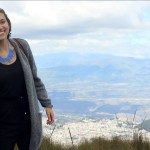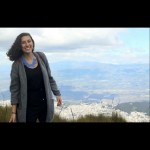I grew up in upstate New York, surrounded by farms, suburbia and forests. My summers were filled with tubing with my best friend in her boat on Lake George, going to summer camp in the Adirondacks and biking for miles through the paths that started in my neighborhood.
I’ve been fortunate enough to see beautiful places like Glacier National Park, Yellowstone and the Grand Canyon (more than once). I’ve traveled to Hawaii, several countries in Eastern and Western Europe and skied along the East Coast and Canada.
As a child, I had a fear of many things. My mom likes to tell me it began on a Disney cruise at the age of three, when one day, I decided I didn’t like the fish touching me anymore and I decided to stop swimming. As I grew up, my list of fears and phobias grew: jumping (falling) from high places, deep water (drowning) and the universe (what’s out there, why are we here — that type of deal). Deep stuff, I know.
My method of coping with these fears was to not cope with them at all. I never swam too far out, I stopped cliff jumping after I realized how terrified I was and I didn’t let myself think about the universe and my place within it too late at night.
But I have never felt like I did when I traveled to the Galápagos with my school last week for spring break. I spent five days on a yacht that sailed to Santa Cruz, Floreana, Española and San Cristóbal. Every day, small groups of passengers departed the boat on zodiacs to nearby islands or bodies of water with trained naturalists. There, we hiked, snorkeled and explored the islands. The naturalists taught us about the animals we saw, the climate and the constellations in the incredibly clear night sky.
On the second night of the trip, one of the naturalists explained the constellations to several of us on the roof deck. As he pointed out different stars, he mentioned that we are all made of stardust.
“That cheesiness totally killed the moment,” I thought. But then he explained.
When a supernova occurs, the elements that were in a star are spread across the universe, including our planet. Material in our body is made of that residual stardust and is recycled every couple of years from the nutrients we use from plants. All my life, I thought this was a Tumblr quote teens used to make themselves feel special, but learning this scientific fact actually made me feel different.
The more I learned, the more connected I felt. I watched the blue and red Nazca boobies and the mating patterns of the frigatebirds, which inflate their red, heart-shaped throat pouches to attract females. I saw the only penguins that live on the equator and Charles Darwin’s famous finches.
I snorkeled three times, each time easier then the next, with sea lions, rays and colorful fish dancing around me. This time, I wasn’t even bothered by the fish touching me.
I watched a pelican eat baby sea turtles out of the sand from about three feet away. Later that day, we saw sharks and sea lions feeding on flying fish on the side of our boat. The morning after, a group of us jumped about 30 feet off the boat’s side.
I gradually lost fear because I realized fear was irrational. It felt empowering to share the knowledge of the naturalists, and to realize how interconnected the world is. I no longer feel like the ocean, something that takes up approximately 65.7 percent of the world’s surface as an elusive mass, but instead found something I want to learn about and understand.
We traveled to islands that felt like other humans had never walked on. This is because there are stringent rules about what you’re allowed and not allowed to carry onto the islands. The islands were inscribed on the World Heritage List in 1978 and recognized in 1984 under the United Nations Educational, Scientific and Cultural Organization and the Biosphere Program in 1984. Ninety-seven percent of the islands are associated with the National Park, and only 3 percent are used for tourism and human establishments.
My favorite moments occurred when I was sitting alone, appreciating the silence and watching the ocean and animals interact before me. This trip was the kind of intimate and spiritual experience you read about, and a wake-up call to be more connected with my surroundings. I know I will return to the Galápagos and other places I would not have traveled to if I didn’t have this newfound confidence and curiosity regarding the environment and conservation.
I think Kurt Vonnegut’s quote from the novel “Galápagos” expresses how I feel better than my sentimental ramblings. He wrote, “Just in the nick of time they realized that it was their own habitat they were wrecking — that they weren’t merely visitors.”
Two days later, I still feel like I’m on a rocking boat, and I definitely have a parasite from swallowing so much ocean water, but I couldn’t be happier to have these mementos to remind me that visiting the Galápagos wasn’t just a dream.


